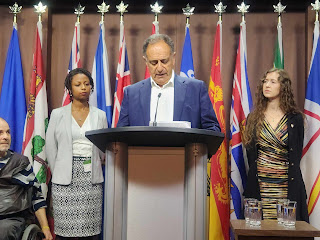Alex Schadenberg
Executive Director, Euthanasia Prevention Coalition
Link to the press conference recording (Link)
 |
| Gordon Friesen (on the left) |
The Hon. Ed Fast (Abbotsford) MP sponsored Bill C-314, the Mental Health Protection Act, which had its second hour of debate in parliament on Thursday October 5, 2023.
Gordon Friesen, President of the Euthanasia Prevention Coalition, explained why EPC supports Bill C-314 and told the media that Québec has rejected euthanasia for mental illness alone.
 |
| Anike Morrison |
She said that if MAiD had been presented as an option to her at that time as a solution to her emotional pain and distress:
I may not be here today. It was a very rough
time. It was only through the care of the
psychiatrists, psychologists, pharmacists and
social workers that I was able to get better and
move through that time in my life.
Anike has completed her undergraduate degree, has travelled and most importantly she loves her life. She is on the "other" side of that dark period.
Anike spoke about all the suicide prevention measures that were put in place for her, measures that care for people at a vulnerable time. She stated:
Anike spoke about all the suicide prevention measures that were put in place for her, measures that care for people at a vulnerable time. She stated:
As Canadians we can't do both. We can't put our emphasis on preventing suicide while also presenting MAiD as an option.
 |
| Garifalia Milousis |
Garifalia wrote a letter to every Member of Parliament and Senator telling them that as a person who lives with mental illness, she is opposed to the expansion of euthanasia to include mental illness.
Garifalia was 15 years-old when she "descended" into darkness. She described her depression as the world losing its colour. Her first experience with depression lasted for 6 months and it caused her to experience anorexia, bulimia, and other forms of self-harm.
Her depression returned again and again. She feared that she would have to live with her depression forever. Garifalia decided that, facing the prospect of life-long mental health suffering that death was her only solution. She attempted suicide seven times during her period of acute pain.
If you had offered me Medical Assistance in Dying at that time I would have taken it because I genuinely believed that death was the only solution.Garifalia said that unless you have experienced mental illness you can't understand how patronizing it is to hear people distinguish between medical assistance in dying and suicidality. They argue that those who are suicidal are irrational while those who want MAiD are rationally choosing to die.
Death was not something I pursued because it was what I wanted, it was something I pursued because I thought it was the last solution to the suffering I was experiencing.
Any differentiating between suicide and MAiD is non-sensical and we have almost recognized this by how we have expanded euthanasia (MAiD) to include individuals whose only underlying condition is a mental illness.
I have watched society debate this academically and I ask people to consider how it will impact individuals like me?
 |
| Dr Paul Saba (Center) |
Half of the people seeking treatment first talk to their family doctor. The problem is that there is a shortage of family doctors, psychiatrists and psychologists. He explained that our health care and our social system is deficient for people with mental health problems. Dr Saba continued:
The average waiting time for mental health treatment in Québec is 5 months, and yet, our MAiD law, for those who are not terminally ill, has a 90 day waiting period, so many people won't even have a chance to receive treatment.Dr Saba continued:
There is always a reason to live, but as care-givers we have to help our patients find a reason to live. No one actually wants to die by suicide. People just want to end their distress.
90% of people who attempt a suicide and receive treatment don't want to die. Most psychiatrists don't support euthanasia for mental illness because of their concern for their vulnerable patients. It is also impossible to decide who'se condition is irremediable.Bill C-314 will protect people who are living with mental illness from medical assistance in dying (MAiD).
Mental illness does not meet the legal condition for free and informed consent for medical aid in dying. The more a person struggles with mental illness, the less likely they are to meet the criteria for free and informed consent.
By expanding medical aid in dying to the depressed they are finding a quick and easy solution to get rid of people with mental health disorders.
It is killing those who need to be cared for. We must become a society that cares for people with mental health problems rather than killing them.
The latest Angus Reid Institute survey indicated that only 28% of Canadians support MAiD for mental illness. 82% of Canadians stated that mental health care should be improved before MAiD is considered.

I read this post your post so nice and very informative post thanks for sharing this post
ReplyDeleteDepression Ottawa
Psychiatrist near me
OCD Psychiatrist Near me
rTMS near me